Pulse Live 2014 highlights
- GPC deputy chair Dr Richard Vautrey defends its negotiating stance
- Delegates vote overwhelming in favour of a motion that GPs are overtreating and overdiagnosing elderly patients
- Dr Chaand Nagpaul, GPC chair, and the deputy medical director of NHS England, Dr Mike Bewick, on stage as part of GP question time
17:15 And that concludes the conference. There will be updates later on this evening, but thanks you all for reading and especially those delegates who braved the tube strike to attend what was a wonderful conference. See you all in Manchester…
16:50 A question on recruitment and how to stem the tide of GPs leaving the profession ends up coming down to another discussion on demand… GPs just utterly frustrated with not being able to manage everything in a 10-min consultation.
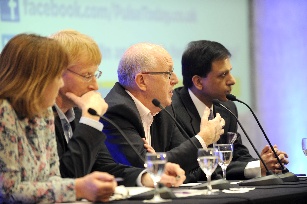
Dr Amanda Doyle of NHS Clinical Commissioners says time and investment is needed to do ‘proper’ GP work.
16:45 A major theme of the question time is GPs learning to say ‘no’ to extra work. As one delegate puts it:
#PulseLivedebate panel says GPs need to start saying no to GP ‘dump’ from 2nd care, 3rd party services & everyone else. #1careRevolution
— DrGandalf (@drgandalf52) April 30, 2014
16:30 The final debate of the conference, featuring Dr Chaand Nagpaul, GPC chair, and the deputy medical director of NHS England, Dr Mike Bewick, is under way.
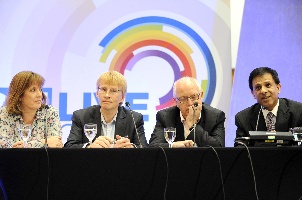
There is much support in the audience for GP asking about how to confront workload issue when Government is ‘stoking up demand’ and with steady drip of toxic media coverage
Dr Bewick says the £50m fund for extending access produced some solutions to help commissioners share more across different agencies. He adds GPs can find solutions too and its NHS England’s job to support those.
15:20 The session on patient complaints gives a breakdown on what the complaints usually address:
#pulselive1/3 of complaints due to clinical care, 20% communication, 19% administration
— GP Education WMids (@GPEducation) April 30, 2014
#pulseliveSafety incidents in 2% of consultations, 3% hospitalised, 42% preventable. V few lead to complaints.
— GP Education WMids (@GPEducation) April 30, 2014
14:40 Dr Robert Morley, executive secretary of Birmingham LMC and GPC lead of contracts and regulations has begun his talk on ‘meeting your CQC requirements’ by outlining some of the problems raised with the first year of inspections.
Concerns flagged by GPs so far have included the overly beuracratic registration process, problems with DBS checks,and inconsistent envies on guidance front the CQC. He added that there have been positive reports from inspections, but still plenty of concerning issues with GPs flagging problems with their inspectors attitudes and inconsistencies in their inspection.
14:30 GPC deputy chair Dr Richard Vautrey, speaking at one of the morning sessions, was giving a talk on the 2014/15 contract changes. He defended the negotiating stance, including the unplanned admissions DES. Read the story here.
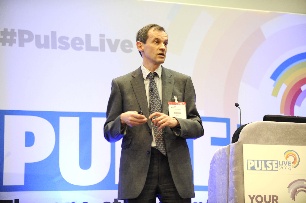
13:20 It’s lunch, but we have some extra reading for you from the morning session – on delegates voting overwhelming in favour of a motion that GPs are overtreating and overdiagnosing elderly patients.
11:50 We’re into breakout sessions now, and deputy chair of the GPC Dr Richard Vautrey explains the new contract changes to delegates.
GPC deputy chair @rvautrey is on stage at #PulseLiveexplaining this year’s #GP contract changes pic.twitter.com/imNR0kKLKY
— Sofia Lind (@sofialind_Pulse) April 30, 2014
11:15 Delegates are currently on their break after the debate. Our reporter, Alex Matthews-King, has tweeted a picture of the debate:
After our #pulselivedebate, around 80% of delegates felt they are overdiagnosing/treating their older patients pic.twitter.com/cUsZ2GzesU
— Alex Matthews-King (@AMatthewsKing) April 30, 2014
10:35: The debate ends with even more delegates voting in favour of the statement that ‘GPs are overdiagnosing and overtreating older patients’ – Professor Haslam puts it at 88% of the room.
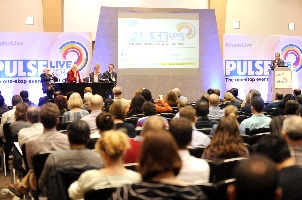
10:30 Delegates are putting their views on twitter:
Diagnosing dementia isn’t about drug treatment – it’s about social care, discussion with families, planning for the future #pulselive
— Georgia Belam (@GeorgiaBelam) April 30, 2014
10:20 This morning’s Big Debate, on whether we are over treating elderly care, sees delegates describe a number of dilemmas: when is it right to let a patient die, rather than put in drugs for pneumonia? Who is over treated and for whom could that heart attack have been avoided?
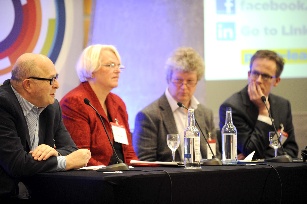
Professor Peter Crome, from Keele University, adds: ‘Then there is the question of how you present the options to the patient. “Well you don’t want to take this drug, do you, because it is really toxic”.’
9:45 Professor David Haslam, who valiantly stepped in for Professor Steve Field yesterday, again opens the conference today. He advises ‘never call yourself just a GP’.
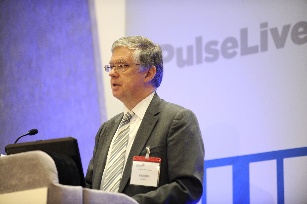
Before the main debate of the morning, he asks whether delegates believe GPs overtreat elderly patients – around 80% agree they do.
Wednesday 30 April 2014 9:00 Welcome back to the live blog. The tube strike is still on, but if yesterday is anything to go by, it will put very few delegates off. Highlights today include a question time debate with, among others, the chair of GPC, Dr Chaand Nagpaul, and deputy medical director of NHS England Dr Mike Bewick.
17:00 And that is all from us for today. There will be more stories and news on the website over the evening. Join us back here tomorrow.
16:48 Professor Haslam told delegates that ‘I am concerned that a lot of the doctors I meet are absolutely drowning in work’ and added that he was frustrated by headlines which decry access problems without acknowledging they’re caused by GPs being so overburdened.
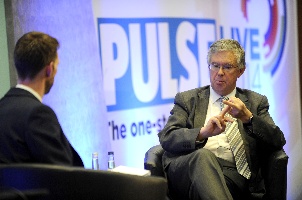
But he added that he had met GPs who were happy with the work and that their sense of being in controls as key, he told delegates ‘I met a GP who was fine, and what was different for her was that she had control, in their practice they had personal lists’.
16:35 Professor Haslam expands on his earlier comments about the direction of NICE guidance:
On producing relevant NICE guidance, Prof Haslam says this isn’t cloud cuckoo land totally separated from the real doctor #PulseLive
— Alex Matthews-King (@AMatthewsKing) April 29, 2014
16:10 The tube strike claims its most high-profile victim (at least in terms of Pulse Live). Professor Steve Field is stuck in traffic and is unable to attend. But we have an equally big name stepping in – Professor David Haslam, a fellow former chair of RCGP, and current chair of NICE.
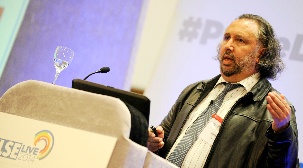
15:24 Our cover feature this month is on extended access, and one of the pioneers – Dr Ivan Benett, clinical director of NHS Central Manchester CCG – says that it would be too expensive to roll out as a nationwide scheme:
Dr B says ‘no’ the government couldn’t afford to roll acces pilot to the whole country. So it’s important to show sustainability #PulseLive
— Alex Matthews-King (@AMatthewsKing) April 29, 2014
15:02 Patient demand is a huge issue for delegates, as Pulse commissioning editor Ellie Broughton points out:
One GP in Dr Cornish’s talk claimed a stricter self care policy stopped her inner city practice going under #PulseLive
— Ellie Broughton (@___ellie) April 29, 2014
14:48 In the burnout session, there is much talk of managing patient demand. The conclusions are that GPs should be firm about not providing letters for schools, ‘fitness to fly’ notes. Delegates also believe there needs to be a bolder conversation with public about when you need to see the GP.
14:39 Another story on the website: a locums chief has said ‘miserable’ former partners make up the majority of GPs entering locums’ chambers. Read the story here.
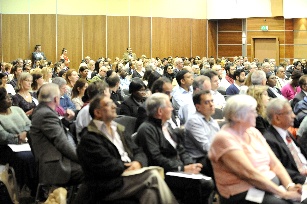
14.28 In the ‘avoiding burnout’ breakout session, Dr Fiona Cornish says that she believes working less than full time will become the norm for GPs.
The current 12 hour-day workload is ‘unsustainable’, with fewer GPs able to cope, resulting in not only female GPs taking up the part-time option.
She believes that this less-than-full-time model will have to become the norm, in line with the RCGP’s model for sustainable general practice.
Last year, Conservative MP Anne McIntosh told the House of Commons that the increased numbers of women GPs caused a strain on the NHSbecause they took time off to raise children.
1.17 Dr Ken Aswani explains that, for unplanned admissions DES once at-risk patients are identified they must be assigned an accountable GP.
This doesn’t mean the patient can only see this GP, but means that accountability for coordinating their care rests with this GP even where care is primarily in other settings.
For patients identified as at risk, practices will need a hotline for patients to reach their accountable GP. This could be an ex-directory number for the practice, but it’ probably easiest to have mobile which is reserved for this purpose.
This number can then be shared with care homes, and other care providers for the patient.
14:05 After lunch, we’re underway again in breakout sessions – including one devoted to the unplanned admissions DES:
Dr Ken Aswani now explaining how to make the unplanned admissions DES cost effective for your practice. #pulselivepic.twitter.com/JfKH26kZU8
— Alex Matthews-King (@AMatthewsKing) April 29, 2014
12:55 Earlier, there was a vote on whether the profession should become salaried. You can read the story in full here.
12:51 You learn something new every day – but especially at the Pulse Live conference:
Learned a new acronym VOMIT -victim of modern imaging technology re incidentoloma for headaches #PulseLive
— DrGandalf (@drgandalf52) April 29, 2014
12:02 Professor David Haslam, chief executive of NICE, said that guidelines will move towards dealing with multimorbidities. Read the full story here.
11:54 GPC member Dr Nigel Watson explained that their aim with the contract was to remove some of the ‘stupidity’ in QOF, particularly asking patients about their DIY or gardening habits.
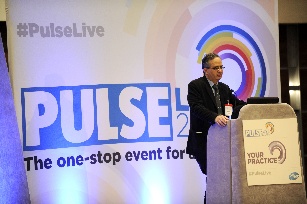
But he reminded delegates that the cut QOF points are now rolled into a national global sum, so high QOF earners won’t automatically recoup this money, as it’s based on need.
For most practices the change will be cost neutral, but he said some practices may lose out and gives the example of a practice with a young population and high prevalence of coronary heart disease, though this would be rare.
11:28 Copperfield made it to the conference despite having to walk all the way from the other side of the country (so he says). His first blog of the event discusses Professor David Haslam being ‘right on the money in his state of the nation address’, and the ‘unfair, two-on-one fight’ on salaried GPs. Read it in full here.
10:48 It seems as though it was a pretty one-sided debate:
So a resounding no vote from the audience – I didn’t see anyone in favour of the motion for all GPs to be salaried employees #pulselive
— Georgia Belam (@GeorgiaBelam) April 29, 2014
10:25 The first debate of Pulse Live is well under way – and it is on whether GPs should become salaried or not. An initial vote reveals a smattering of GPs in favour; but the majority are against.
10:25 The first debate of Pulse Live is well under way – and it is on whether general practice should become wholly salaried or not. An initial vote reveals a smattering of GPs in favour; but the majority are against.
Professor Azeem Majeed argues the BMA should look very carefully at a completely salaried model. ‘Though we lose some independence, it’s the way forward in the long term,’ he says.
Londonwide LMC chief executive Dr Michelle Drage says GPs would lose ‘the three As’ by becoming salaried: ‘Advocacy, autonomy, and attitude’.
9:50 Pulse editor Nigel Praities welcomes everyone to Pulse Live! There’s a good turnout, despite the London Underground strike. Our keynote speaker Professor David Haslam takes to the stage.
He speaks about how broad the role as a GP is – and how a conference like Pulse Live highlights this. ‘The complexity and generality of general practice is simultaneously what keeps us sane and what threatens us with burnout,’ he says.
A focus for NICE is multi-morbidity, he says. ‘When it comes to long-term conditions, single conditions are a bit of a rarity.’
21.08 Anticipation is building on Twitter about Pulse Live, with many GPs tweeting in their questions for the Big Interview with the CQC’s chief inspector of general practice Professor Steve Field. You can tweet yours at Pulse editor Nigel Praities here. Here are a selection of the questions already submitted:
@nigelpraities@profstevefield@pulseliveuk if CQC finds a struggling surgery do they go for a pastoral or punitive approach?
— Phil Williams (@scottishphil83) April 28, 2014
@nigelpraities@ProfSteveField@PulseLiveUK how about GPs feeling bashed from all sides media/gov/CQC & how CQC can promote a diff narrative
— Thomas Round (@drtomround) April 28, 2014
@nigelpraities@ProfSteveField@PulseLiveUK What importance do you put on the practice PPG’s opinion as part of the inspection?
— Richard Blogger (@richardblogger) April 28, 2014
20.00 Welcome to the live blog from the Pulse editorial team describing all the developments at the Pulse Live as they happen. We are starting early tonight, with a sneak look at the programme coming up. Click here to download a copy.
Pulse October survey
Take our July 2025 survey to potentially win £1.000 worth of tokens











